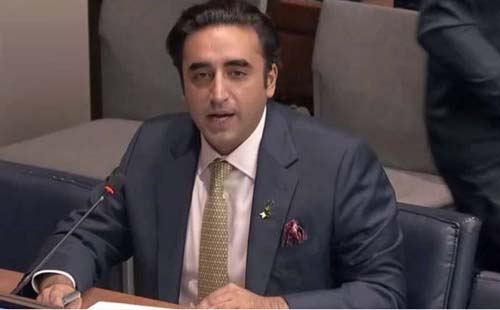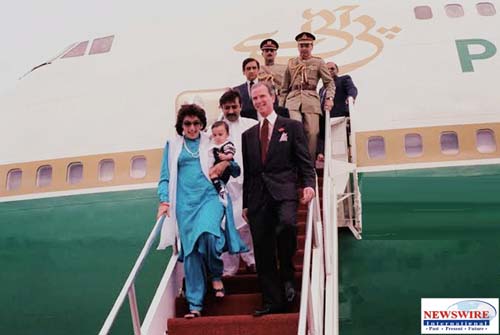Seeking reset of US-Pakistan ties, Bilawal says they agree on far more than they disagree on

Washington: Foreign Minister Bilawal Bhutto Zardari has called for a reset of the strained US-Pakistan relations through engagement, saying he believes the two countries agree on far more than they disagree on.
“The way in which this relationship progressed in recent years doesn’t serve the interests of the people of Pakistan, but it also doesn’t serve the interests of the people of America,” he was quoted as saying in an interview with The Washington Post. “And I still believe that Pakistan and the United States agree on far more than we disagree on.”
Post Correspondent Josh Rogin, who interviewed Bilawal Bhutto Zardari, used the foreign minister’s comments in his regular column to the newspaper’s Friday edition.
Pointing out that Bilawal Bhutto came to the United States last week to explore yet another attempt to repair the U.S.-Pakistan alliance, columnist Rogin urged Washington to hear him out. (The foreign minister came to New York on May 17 to attend high level meetings at the United Nation on food security.”
Noting that leaders in both U.S. political parties (Republican and Democratic) have largely written off Pakistan, columnist Rogin wrote, “Yet it is a major non-NATO ally, the world’s fifth-most-populous country and a nuclear power situated strategically among China, India, Afghanistan and Iran.
“After years of mutual distrust between Washington and Islamabad, there are plenty of reasons to be skeptical of the idea that either side is capable — much less willing — to do the hard work of reviving the alliance”, he wrote.
But correspondent Rogin said that the basic argument for trying to improve relations again is sound. And the Pakistan foreign minister believes that both nations can learn from the mistakes of the past.
Besides, FM Bilawal said, letting the alliance further deteriorate makes little sense.
Columnist Rogin said the main lesson FM Bilawal took from his family’s epic battles with other powerful Pakistani institutions was that change should be pursued slowly and through negotiation, not confrontation.
“Even though I’m young and I’m supposed to be a lot more idealistic and revolutionary, because of our [family’s] experience, I actually believe in evolution over revolution,” the foreign minister was quoted as saying.
Rogin wrote, “Perhaps this strategy of lowering short-term expectations and focusing on incremental progress could be applied to the U.S.-Pakistan relationship as well. Although (Imran) Khan’s accusations of U.S. meddling in Pakistan’s politics are ridiculous, they play off an anti-Americanism that has become deeply rooted in parts of the Pakistani polity. Likewise, in Washington, there’s no strong domestic political constituency for improving U.S.-Pakistan ties.” But, FM Bilawal said there are reasons to think progress is possible.
“The main issue of contention, the war in Afghanistan, could now be an area of cooperation following (President Joe) Biden’s troop withdrawal last year. Now, the two countries’ interests there are largely aligned around encouraging the Taliban to behave better and bringing stability to the Afghan people.
“Now we can move beyond that disagreement without having to go back and litigate the past,” the foreign minister was quoted as saying. “There’s a lot more common ground now and less fog of war.”
Diversifying the relationship beyond military issues might also help, FM Bilawal said, noting that In his meeting with Secretary of State Antony Blinken in New York last week, they discussed moving toward more cooperation on trade, climate change, tech investment and food security.
“Don’t expect the Sharif-Zardari government to change those policies anytime soon,” Columnist Rogin warned. “But unrealistic expectations on both sides are a big part of why the relationship got so bad in the first place”.
“If we’re going to let our emotions get in the way of a constructive relationship, then we would both be cutting off our nose to spite our face,” FM Bilawal said. “How do we tackle that? The only answer is engagement.”
In this regard, Rogin said Pakistan’s “offer of a reset must be embraced, not ignored.”

Shaheed Benazir Bhutto, The Prime Minister of Pakistan, carrying her son “Bilawal Bhutto Zardari”, leaving an airliner upon her arrival for a state visit at “Andrews Air Force Base”. US 05-06-1989





